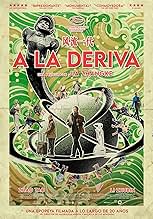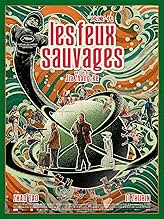VALUTAZIONE IMDb
6,7/10
1765
LA TUA VALUTAZIONE
Una donna cinese vive per sé in silenzio, celebrando la prospera Belle Epoque con canti e danze.Una donna cinese vive per sé in silenzio, celebrando la prospera Belle Epoque con canti e danze.Una donna cinese vive per sé in silenzio, celebrando la prospera Belle Epoque con canti e danze.
- Regia
- Sceneggiatura
- Star
- Premi
- 7 vittorie e 15 candidature totali
Recensioni in evidenza
The photography was superbe, grandiose or intimate, always striking. OTOH, I (and my date) was unable to follow the story at all. Perhp[as if I knew more about Chinese geography and social customs it would have made more sense, but as it was it left me with nothing more than a huge dark question mark covering over any thought I might have had about the film, a physical rejection of the sound level of ports of it, but also with a trove of images - both nature, man-made, and of haunting faces that will not soon fade away. The one thing that provided some unity came to me afterward when I thought about the title and realized that the movement of the film is analogous to the tide -- washing out to sea bringing all kinds of things from elegant boats to detritus with it, then flowing back upstream.
This is a movie about smoking, chain smoking in fact, by people who don't even know how to smoke. Left overs from prior movies, or stuff shot when you were wandering the streets with a spare digital camera. Tie it up with shots of a woman staring out into space, walking around lost, eating. There's actually a narrative on a black & white screen like in old silent movies, except there's no story to tell.
There's actually a scene where the woman tries to get out of a bus, but some man keeps catching her and throwing her back in her seat. This is repeated at least 10 times, I guess there were 10 takes. Might as well use them all. Lots and lots of sentimental songs, shots of crumbling buildings, boats going down the river. Heard enough?
There's actually a scene where the woman tries to get out of a bus, but some man keeps catching her and throwing her back in her seat. This is repeated at least 10 times, I guess there were 10 takes. Might as well use them all. Lots and lots of sentimental songs, shots of crumbling buildings, boats going down the river. Heard enough?
This one is the real deal; our esteemed director (all of his projects are foremost "director's films") is one of the greats whom you can discuss in the same breath as Vigo and Varda without puffery.
Jia has a tremendous feel for the Chinese people and is able to capture the textures and rhythms of life there like few others I know. It's this humanity and curiosity, combined with incisive wit and subtle indictment of hypocrisy, that allow him to sidestep censorship of politicized content.
This movie could have been a slight and indulgent scrapbook, but the cast and creative teams--working over an extended schedule to make 'Boyhood' blush--keep the whole thing pitch perfect. Like that earlier milestone film, it's a movie almost without any big moments... and yet there is a vast catharsis that fills in during its latter half.
By the time it gets to the last shot, which I now count among my favorite final shots in cinema history, it achieves a sweeping and yet deeply personal sense of determination in the face of the unknown future we all face. I recommend you see it with a lot of people at a cinema.
Jia has a tremendous feel for the Chinese people and is able to capture the textures and rhythms of life there like few others I know. It's this humanity and curiosity, combined with incisive wit and subtle indictment of hypocrisy, that allow him to sidestep censorship of politicized content.
This movie could have been a slight and indulgent scrapbook, but the cast and creative teams--working over an extended schedule to make 'Boyhood' blush--keep the whole thing pitch perfect. Like that earlier milestone film, it's a movie almost without any big moments... and yet there is a vast catharsis that fills in during its latter half.
By the time it gets to the last shot, which I now count among my favorite final shots in cinema history, it achieves a sweeping and yet deeply personal sense of determination in the face of the unknown future we all face. I recommend you see it with a lot of people at a cinema.
The most striking thing about this film is seeing the natural aging of the actors, but the collage of the different projects into a single film is rather shaky and risks turning off several people at the start of the film. Several bold choices from the directors, including the use of intertitles and what appear to be images taken from surveillance cameras. When we get to the end of the film, we can be moved and consider this project as a good film, especially with the evolution of the relationship between the two main characters, but the first part prevents us from being very generous for the rating of the work. Good use of music (it's more of a musical film than a dialogue film). Good soundtrack. Good finale.
Have you ever bought an album by a band and find that, rather than new material, it's some old B-sides, remixes and a couple of new songs for added value? Of course you have, if you're over thirty-five, that is. Jia Zhang-ke's "Caught by the Tides" is in many ways just that. But in doing so, it does make a statement about his career, and indeed the changing face of the world around him.
Qiao Qiao (Zhao Tao) shares a romance with Guao Bin (Zhubin Li), but he moves on, with Qiao Qiao trailing in his wake. Over the years, and across the country, she follows him. But on reaching her destination, maybe what she's been wanting isn't for her.
But in reality, the plot is irrelevant, as much of this has already been written and filmed over the years; it has now just been repurposed. Outtakes from the likes of "Unknown Pleasures" (2002), "Still Life" (2006) and "Mountains May Depart" (2015), if I remember correctly. This allows to realistically show the two leads over time, and their unequal ageing. Scenes are, therefore, different, but very familiar, in what serves as something of a retrospective for Jia's work, in a more direct and better-executed way than Takeshi Kitano attempted with "Takeshis'" (2005).
The problem with creating a film in this way is that while it's perfectly serviceable as a narrative film, shoehorning in what you already have makes this feel a little awkward in terms of flow. It feels more a series of vignettes than a well-constructed work. Having seen many of the films the outtakes are from serves to remind you of the original scenario, and so doesn't quite feel like a single story, but various stories stuck together.
But there are some nice coincidences that materialise and allow Jia's message to come across. Text messaging on an old Nokia become TikTok videos on the latest smart phone. Jia is very tongue-in-cheek with his look at technology. TikTok stardom serves more for cheap advertising than actual fame and fortune; and service robots can be easily confused with simple questioning. Technology has played an interesting role in shaping the nature of human relationships, especially over the past twenty years.
Knowing Jia's work, you will instantly recognise what is going on here. But if coming to his work fresh, this may seem like a slightly strange film that doesn't quite tie together nicely enough. Some scenes don't seem to really fit; more added in as they were available.
So, this may require some background work for the uninitiated, and is one more for long-term fans. Though they might feel they are watching "Still Life" again. Has life moved on in the past eighteen years?
Politic1983.home.blog.
Qiao Qiao (Zhao Tao) shares a romance with Guao Bin (Zhubin Li), but he moves on, with Qiao Qiao trailing in his wake. Over the years, and across the country, she follows him. But on reaching her destination, maybe what she's been wanting isn't for her.
But in reality, the plot is irrelevant, as much of this has already been written and filmed over the years; it has now just been repurposed. Outtakes from the likes of "Unknown Pleasures" (2002), "Still Life" (2006) and "Mountains May Depart" (2015), if I remember correctly. This allows to realistically show the two leads over time, and their unequal ageing. Scenes are, therefore, different, but very familiar, in what serves as something of a retrospective for Jia's work, in a more direct and better-executed way than Takeshi Kitano attempted with "Takeshis'" (2005).
The problem with creating a film in this way is that while it's perfectly serviceable as a narrative film, shoehorning in what you already have makes this feel a little awkward in terms of flow. It feels more a series of vignettes than a well-constructed work. Having seen many of the films the outtakes are from serves to remind you of the original scenario, and so doesn't quite feel like a single story, but various stories stuck together.
But there are some nice coincidences that materialise and allow Jia's message to come across. Text messaging on an old Nokia become TikTok videos on the latest smart phone. Jia is very tongue-in-cheek with his look at technology. TikTok stardom serves more for cheap advertising than actual fame and fortune; and service robots can be easily confused with simple questioning. Technology has played an interesting role in shaping the nature of human relationships, especially over the past twenty years.
Knowing Jia's work, you will instantly recognise what is going on here. But if coming to his work fresh, this may seem like a slightly strange film that doesn't quite tie together nicely enough. Some scenes don't seem to really fit; more added in as they were available.
So, this may require some background work for the uninitiated, and is one more for long-term fans. Though they might feel they are watching "Still Life" again. Has life moved on in the past eighteen years?
Politic1983.home.blog.
Lo sapevi?
- QuizJia Zhang-ke incorporated footage and outtakes from previous films he had directed into this one, including Unknown Pleasures (2002), Still Life (2006), and I figli del Fiume Giallo (2018). About 10 scenes from this film had previously appeared in the aforementioned movies.
I più visti
Accedi per valutare e creare un elenco di titoli salvati per ottenere consigli personalizzati
Dettagli
Botteghino
- Lordo Stati Uniti e Canada
- 286.902 USD
- Fine settimana di apertura Stati Uniti e Canada
- 32.093 USD
- 11 mag 2025
- Lordo in tutto il mondo
- 318.445 USD
- Tempo di esecuzione
- 1h 51min(111 min)
- Colore
- Mix di suoni
- Proporzioni
- 1.85 : 1
Contribuisci a questa pagina
Suggerisci una modifica o aggiungi i contenuti mancanti























